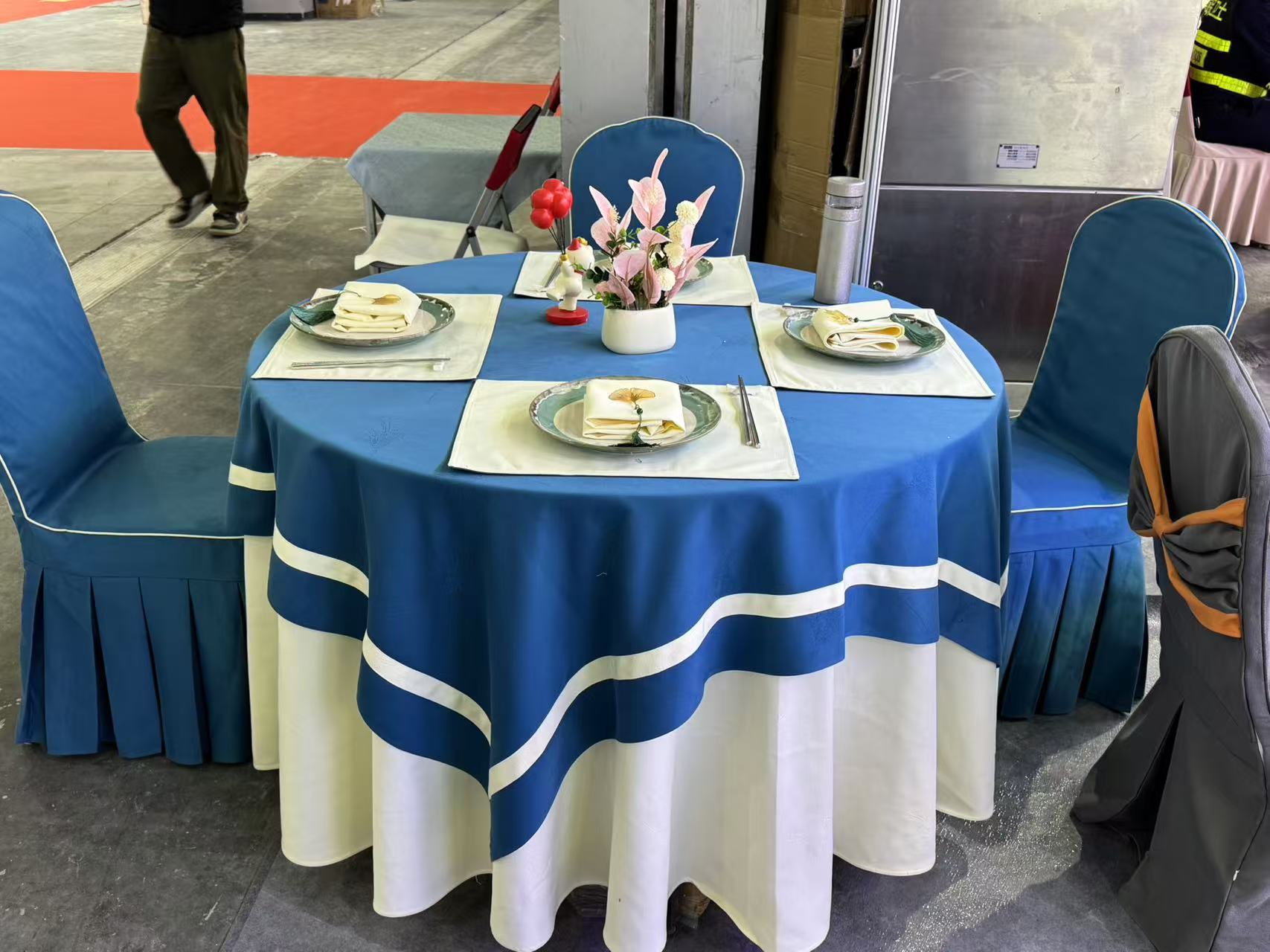客房布草更換頻率的科學(xué)管理
時(shí)間:2025-02-22 來(lái)源:http://www.caibozheng.cn/
在酒店服務(wù)業(yè)中,客房布草的清潔度和更換頻率直接關(guān)系到賓客的住宿體驗(yàn)和酒店的衛(wèi)生標(biāo)準(zhǔn)。為了確保賓客的舒適度和滿意度,酒店需要對(duì)客房布草的更換頻率進(jìn)行科學(xué)管理和合理安排。
In the hotel service industry, the cleanliness and frequency of changing guest room linens directly affect the guest's accommodation experience and the hotel's hygiene standards. In order to ensure the comfort and satisfaction of guests, hotels need to scientifically manage and reasonably arrange the frequency of changing guest room linens.
客房布草主要包括床單、被套、枕套、浴巾、毛巾等棉織品。這些布草的更換頻率并不是一成不變的,而是需要根據(jù)多種因素來(lái)綜合考慮。一般來(lái)說(shuō),酒店的床單、被套及枕套應(yīng)堅(jiān)持每日更換。這是為了確保每位賓客都能享受到如同家中一般的清新與潔凈,同時(shí)也是對(duì)賓客健康的尊重和服務(wù)品質(zhì)的堅(jiān)持。每當(dāng)賓客退房后,客房服務(wù)人員會(huì)立即進(jìn)行徹底的清潔和更換工作,確保下一位賓客入住時(shí)看到的是全新、整潔的布草。
Room linens mainly include cotton fabrics such as bed sheets, duvet covers, pillowcases, bath towels, and towels. The replacement frequency of these linens is not fixed, but needs to be comprehensively considered based on multiple factors. Generally speaking, hotel bed sheets, duvet covers, and pillowcases should be changed daily. This is to ensure that every guest can enjoy the freshness and cleanliness of their home, while also respecting their health and upholding the quality of service. Every time a guest checks out, the room service staff will immediately carry out thorough cleaning and replacement work to ensure that the next guest sees a brand new and tidy linen when they check in.
對(duì)于浴巾和毛巾的更換頻率,則可以根據(jù)賓客的入住天數(shù)靈活調(diào)整。對(duì)于短期入住的賓客,酒店通常會(huì)每?jī)商旎蛉旄鼡Q一次毛巾和浴巾。而對(duì)于長(zhǎng)期居住的賓客,酒店則會(huì)根據(jù)賓客的需求和布草的使用情況,適時(shí)進(jìn)行更換,確保賓客的舒適體驗(yàn)不受影響。這樣的靈活調(diào)整既滿足了賓客的個(gè)性化需求,又避免了不必要的浪費(fèi)。
The frequency of changing towels and towels can be flexibly adjusted according to the number of days guests stay. For short-term guests, hotels usually change towels and bath towels every two or three days. For long-term guests, the hotel will make timely changes based on their needs and the use of linens to ensure that their comfortable experience is not affected. This flexible adjustment not only meets the personalized needs of guests, but also avoids unnecessary waste.
然而,布草的更換頻率并不僅僅取決于賓客的入住天數(shù)和需求。布草的洗滌次數(shù)也是影響更換頻率的重要因素之一。根據(jù)國(guó)際一流酒店的經(jīng)驗(yàn),全棉床單和枕套的洗滌次數(shù)大約為130到150次;混紡(65%聚酯、35%棉)的洗滌次數(shù)為180到220次;毛巾類(lèi)為100到110次;臺(tái)布和口布則為120到130次。這些數(shù)據(jù)雖然經(jīng)過(guò)測(cè)試,但并非絕對(duì)標(biāo)準(zhǔn),因?yàn)橄礈旆椒ā⑹褂妙l率、布草質(zhì)量等多種因素都會(huì)對(duì)洗滌次數(shù)產(chǎn)生影響。
However, the frequency of linen replacement does not only depend on the number of days guests stay and their needs. The frequency of washing linen is also one of the important factors affecting the frequency of replacement. According to the experience of world-class hotels, the washing frequency of cotton bed sheets and pillowcases is approximately 130 to 150 times; The washing frequency of the blend (65% polyester, 35% cotton) is 180 to 220 times; Towels are used 100 to 110 times; The tablecloth and mouth cloth are used 120 to 130 times. Although these data have been tested, they are not absolute standards, as various factors such as washing methods, frequency of use, and linen quality can affect the number of washes.
為了確保布草的使用壽命和酒店的運(yùn)營(yíng)效率,酒店通常會(huì)儲(chǔ)備多套布草。一般最低的標(biāo)準(zhǔn)是3套,一套在各部門(mén)使用,一套在洗衣房洗滌,另一套則儲(chǔ)備在棉織品倉(cāng)庫(kù)備用。這樣的儲(chǔ)備標(biāo)準(zhǔn)可以滿足日常使用和洗滌周轉(zhuǎn)的需求,避免因布草短缺而影響酒店的正常運(yùn)營(yíng)。
In order to ensure the service life of linens and the operational efficiency of hotels, hotels usually reserve multiple sets of linens. The general minimum standard is 3 sets, one set for use in various departments, one set for washing in the laundry room, and the other set for reserve in the cotton fabric warehouse. This reserve standard can meet the needs of daily use and washing turnover, avoiding the impact of linen shortage on the normal operation of the hotel.
此外,酒店還需要注意布草的維護(hù)和保養(yǎng)。正確的洗滌和保養(yǎng)方法可以延長(zhǎng)布草的使用壽命,減少報(bào)損率。酒店洗衣房除了對(duì)布草的正常洗滌外,還需要做好布草的維護(hù)和保養(yǎng)工作,如定期消毒、避免“疲勞使用”等。所謂“疲勞使用”是指當(dāng)天洗滌多次,每天如此會(huì)加速布草壽命的減短。為避免這種情況,應(yīng)讓布草有充分的休息時(shí)間,最少在24小時(shí)以上,即洗滌完之后,休息一天,隔天再使用。
In addition, hotels also need to pay attention to the maintenance and upkeep of linens. The correct washing and maintenance methods can extend the service life of linen and reduce the reporting rate. In addition to normal washing of linens, hotel laundry rooms also need to do a good job in maintaining and upkeep of linens, such as regular disinfection and avoiding "fatigue use". The so-called 'fatigue use' refers to washing multiple times on the same day, which will accelerate the reduction of the lifespan of the linen. To avoid this situation, the linen should have sufficient rest time, at least 24 hours, that is, after washing, rest for one day and use the next day.
總之,客房布草的更換頻率需要根據(jù)實(shí)際情況進(jìn)行合理安排。酒店需要綜合考慮賓客需求、洗滌次數(shù)、布草質(zhì)量、儲(chǔ)備標(biāo)準(zhǔn)等多種因素,制定科學(xué)的布草更換管理制度,確保賓客的住宿體驗(yàn)和酒店的衛(wèi)生標(biāo)準(zhǔn)。
In short, the frequency of changing guest room linens needs to be arranged reasonably according to the actual situation. Hotels need to comprehensively consider various factors such as guest needs, washing frequency, linen quality, and reserve standards, and develop a scientific linen replacement management system to ensure guest accommodation experience and hotel hygiene standards.
本文由 酒店布草 友情奉獻(xiàn).更多有關(guān)的知識(shí)請(qǐng)點(diǎn)擊 http://www.caibozheng.cn 真誠(chéng)的態(tài)度.為您提供為全面的服務(wù).更多有關(guān)的知識(shí)我們將會(huì)陸續(xù)向大家奉獻(xiàn).敬請(qǐng)期待.
This article is a friendly contribution from the hotel linen For more related knowledge, please click http://www.caibozheng.cn Sincere attitude To provide you with comprehensive services We will gradually contribute more relevant knowledge to everyone Coming soon.
資訊推薦Information
聯(lián)系我們Information
